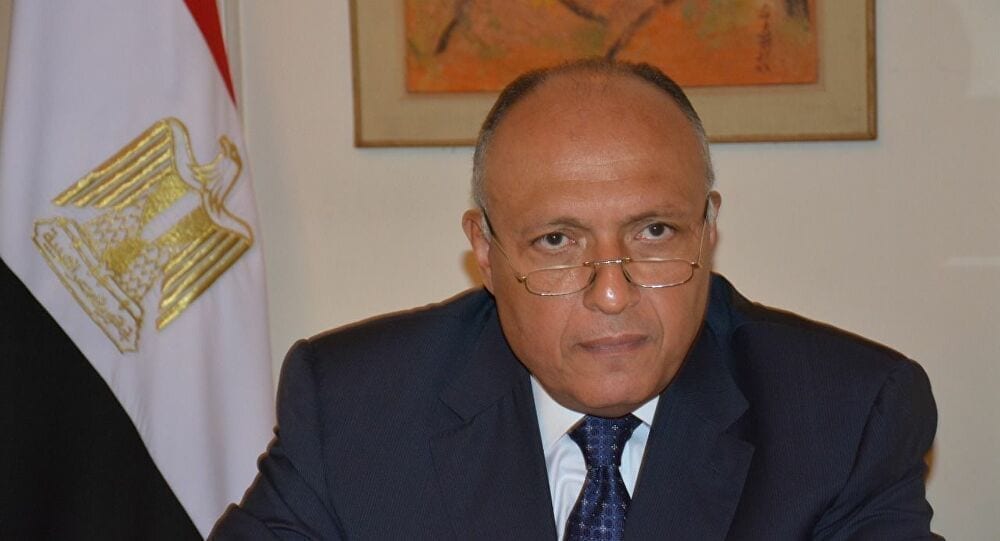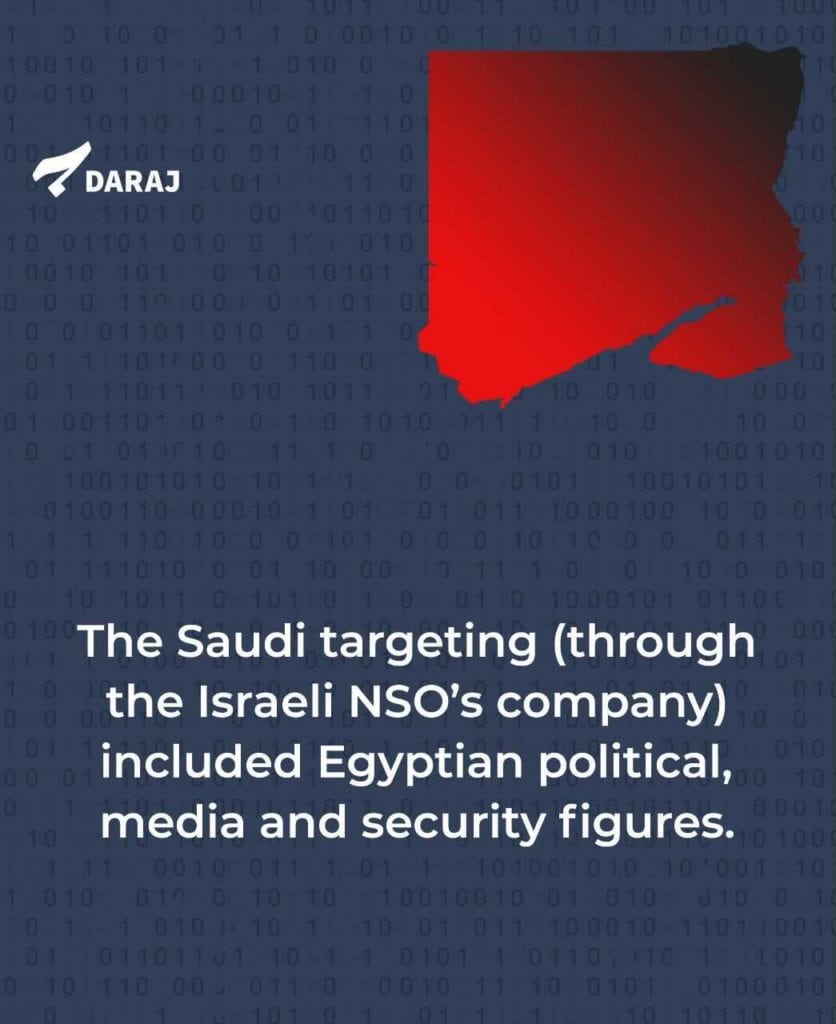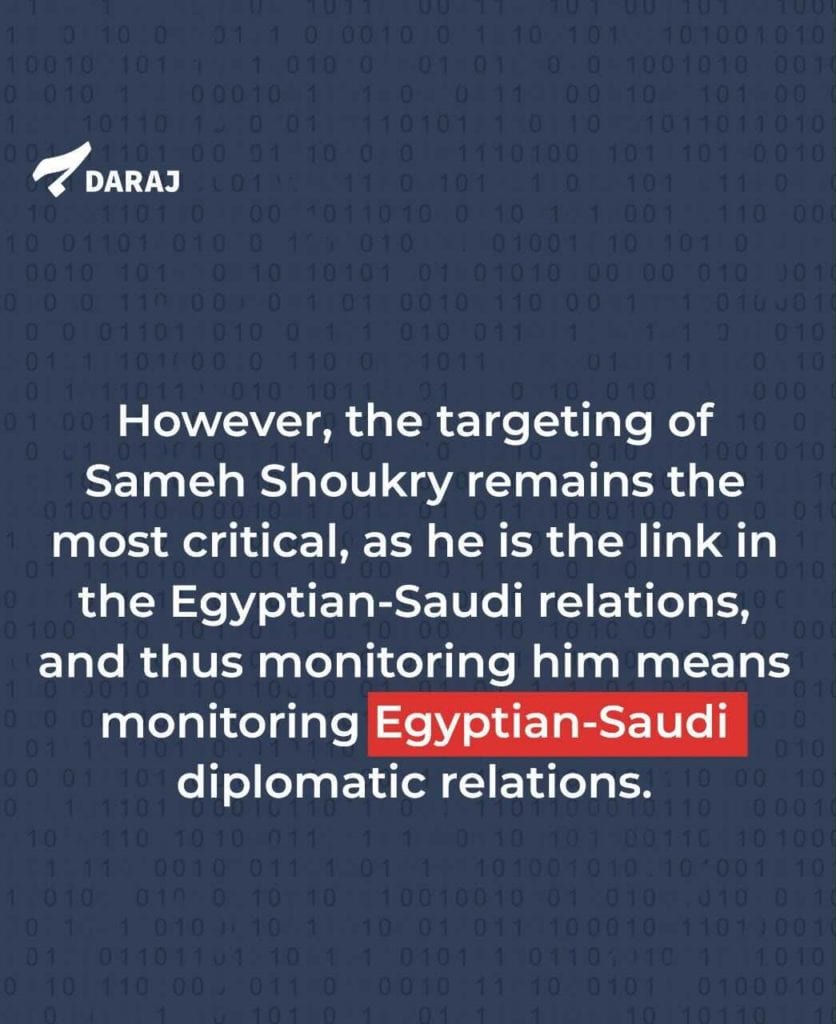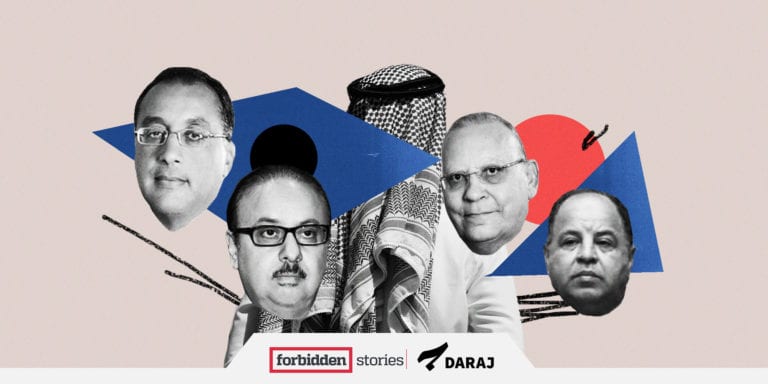This article is part of The Pegasus Project, a collaborative investigation coordinated by the Paris-based media institution Forbidden Stories and Amnesty International’s technical laboratory. The project investigates data linked to the Israeli digital intelligence group NSO, which sells advanced surveillance systems to governments around the world.
80 journalists representing 17 media organizations from around the world, including Daraj, worked to produce this series of investigations.
“If Egypt can change and democratize its government, revive its regional role, and embark on an ambitious program of political and economic reform in its modern history without compromising the integrity of the state, then our brothers in the Arab world and the region can too… This principle continues to guide our approach.”
With that statement, the Egyptian Foreign Minister, Sameh Shoukry, advised his Arab counterparts on how to deal with the period after the Arab uprisings in 2016. Sameh Shoukry is a reflection of the deep Egyptian state, holding on to their political power and suppressing any hope for real change that young people had aspired to at the beginning of the revolution.
His justification of course, that “undermining the institutions of nation-states creates a political and social vacuum that is quickly filled by sectarian militias and terrorist groups.” However, what Shoukry and the Egyptian regime are unaware of is that their Arab counterparts were constantly informed of their activities, because they had been consistently spying on them!

Leaks from the “Pegasus” project [a collaborative investigative project involving more than 80 journalists from 17 press organizations, including Daraj in 10 countries around the world, coordinated by “Forbidden Stories” with technical assistance from Amnesty International’s Security Lab] revealed that over 10 countries purchased the famous Israeli spyware, Pegasus, from the Israeli company NSO to spy on journalists, activists, politicians, diplomats and businessmen in their countries and around the world.
The Kingdom of Saudi Arabia and the UAE appear to be two major clients of the NSO company, even before the UAE normalized its relationship with Israel on August 13, 2020.
Among the phone numbers that Saudi Arabia has tapped on several occasions is the number of the Egyptian Foreign Minister Sameh Shoukry and the Foreign Ministry spokesperson, Ambassador Ahmed Hafez, in the period between March and August 2019. Despite the supposed close alliance between Egypt and Saudi Arabia, especially after the “election” of Field Marshal Abdel Fattah Al-Sisi as president in 2014, the Kingdom is apparently not so comfortable around Egypt and feels the need to monitor their foreign ministry.
The leaks and documents within “the Pegasus Project” did not specify the content of the monitored communications or the reason why a specific person was tapped, and therefore it is impossible to be certain why Shoukry and the Egyptian Foreign Ministry were being spied on. However, recalling the time frame of events in that period may be enough to know the underlying motives behind Saudi Arabia’s interest in monitoring Shoukry.
Who is Sameh Shoukry and Why did the Kingdom Target Him?
Sameh Shoukry is an Egyptian diplomat who has held the position of Egyptian Foreign Minister since 2014, that is, since the first government under current President Abdel Fattah al-Sisi.
Shoukry previously held the position of Egypt’s ambassador to the United States of America between 2008 and 2012, and due to the sensitivity of the diplomatic positions he held, he was a Saudi target.
After obtaining a law degree from Ain Shams University in Cairo, Shoukry climbed the ladder one step further in the diplomatic corps until he became a pillar of the Sisi regime, speaking in its name and knowing all the rules of its game. He was aided by his mastery of three languages: Arabic, English and Spanish.
Shoukry’s value lies in his extensive knowledge of the secrets of regional and global relations between the Egypt and its counterparts. Shoukry also enjoys a high position because of his long experience as a diplomat.
Although Saudi Arabia and the UAE monitor several Egyptian journalists, security and political figures, most notably the current Prime Minister Mostafa Madbouly and other ministers, Shoukry is in an important position as a diplomat who represents the positions of the Egyptian Republic in regional and international forums. Therefore, spying on him is spying on Egypt and Egyptian-Saudi diplomatic relations.
While he was Egypt’s ambassador to the United States, he was a guest of honor at several events, described as “one of the architects of the American-Egyptian relationship” who contributed to maintaining the existing partnership between the two countries. He has also been described as one of the major players in shaping the Middle East today, especially with the relationship between Egypt and Israel.
One of the hot files that Shoukry handled with his ministerial portfolio is the file of the Great Renaissance Dam being built between Egypt and Ethiopia, a vital file for Egypt, especially since it receives 55.5 billion cubic meters of water annually from the Nile River (so they fear that the dam will reduce their share of water).
In June 2021 Shoukry stated that Ethiopia’s statements regarding the Renaissance Dam were “provocative,” saying that his country would not tolerate any harm to its interests.
This came after backlash that targeted him after he said in an interview that the second filling of the Renaissance Dam lake does not pose a threat to Egypt’s interests. Social media sites bashed him, with many seeing this as a reflection of Egypt’s position and the beginning of its surrender in the Renaissance Dam file. Many considered Shoukry’s speech to be unrepresentative of the position of the Egyptian Republic, but rather contradicting it, and therefore demanded his dismissal from office.
While Saudi Arabia and the UAE stood by Egypt and supported reaching an agreement that preserves everyone’s interests, recently some tensions have emerged in Egyptian-Emirati relations.


According to a previous investigation by Daraj: “Publically, they (the Emiratis) verbally support Egypt on their media, but behind closed doors they backstab them and support Ethiopia in completing the Renaissance Dam, collude with Israel to kill the Suez Canal, and finance Haftar’s army to multiply threats from Libya.”
As for other files, let’s take a look at Egypt’s relationship with Qatar, as Egypt was one of the four countries that decided to cut ties and boycott Qatar on June 5, 2017.
In this context, the Egyptian Foreign Minister was known for his bold stances, most notably ignoring Turkish President Recep Tayyip Erdogan at the Islamic Summit (2016) and his harsh responses, for example, to Turkey (2020) and Qatar in the Arab League Council (2017) where he removed Al Jazeera’s microphone from in front of him (2015). Finally, of course was his speech On Ethiopia’s “provocative” statements, as well as other positions that clearly reflected the position of the Egyptian regime on sensitive issues.
As for one of the main issues that Shoukry expressed about the contrast of the Egyptian Republic with the Kingdom of Saudi Arabia, was its position on the Syrian regime changing in 2016. Shoukry said that each country has a “different vision regarding changing the Syrian leadership.”
A Spearhead in Israeli Relations
Shoukry plays a fundamental and central role in the relationship between Egypt and Israel. He participated in the diplomatic processes regarding the Arab-Israeli conflict since the beginning of his diplomatic career in 1978.
Despite Egypt’s pro-Gaza stance in recent events and contrary to the UAE stance, Shoukry recently confirmed on June 18, 2021, in a telephone conversation with the incoming Israeli Prime Minister Yair Lapid, the need to launch a comprehensive negotiating process between the Palestinians and the Israelis, which reflects an Egyptian interest in reconciliation with the Israeli authority.
This is in addition to the appointment of Shoukry’s brother-in-law, Hazem Khairat, as the Egyptian ambassador to Israel since 2012, succeeding Atef Al-Ahl, who withdrew from that position after the Israeli aggression on Gaza that year. Former Israeli Prime Minister Benjamin Netanyahu was clear in his welcome to this step as a positive one in the rapprochement of relations between the two countries.
Shoukry’s wife and Khairat’s sister, Suzy, also has made a name for herself in the United States of America, as she was hosted as a main speaker on several events and occasions. Shoukry’s residence with his wife in America contained a group of valuable artifacts from Egypt.


Timeframe of events (March-August 2019)
There were many regional events between March and August 2019, the most prominent of which were:
– March 11, 2019: Foreign Minister Sameh Shoukry affirmed Egypt’s support for peace and stability in South Sudan, according to a statement issued by Foreign Ministry spokesman Ahmed Hafez.
– March 13, 2019: Shoukry, Deputy Prime Minister and Minister of Foreign Affairs of Slovenia held extensive consultations on ways to strengthen relations between the two countries.
– March 24, 2019: A tripartite summit was held between President Sisi, Jordanian King Abdullah II, and Iraqi Prime Minister Adel Abdul-Mahdi.
– March 26, 2019: Shoukry met with US Secretary of State Mike Pompeo and they discussed bilateral relations between the two countries.
– March 29, 2019: On the sidelines of the Arab Summit, the foreign ministers of Egypt, Jordan and Iraq met to discuss the security situation in the region and the issue of common security in addition to Iranian interference in regional affairs.
– May 24, 2019: Shoukry visited the West Bank and met with Palestinian Authority President Mahmoud Abbas, where he stressed the importance of reviving the peace process between Israel and Palestine.
– 4 August 2019: The Egyptian Foreign Minister went to Baghdad to attend the tripartite meeting with his Jordanian and Iraqi counterparts. The spokesman for the Egyptian Foreign Ministry, Ambassador Ahmed Hafez, said that the meeting discussed ways to enhance tripartite cooperation in various fields and exchange views on Arab, regional and international issues that concern the three countries.
-August 07, 2019: Egypt and Greece signed an agreement on how to divide the territorial waters, a move quickly denounced by Turkey.
-August 19, 2019: US Secretary of State Pompeo spoke with his Egyptian counterpart and they agreed on joint bilateral cooperation in confronting the Islamic State and Al-Qaeda. They shared concerns about the continuing violence in Libya and agreed on the need for a political solution to the conflict. They also stressed the strong partnership between the United States of America and Egypt on important regional and security issues.
– August 21, 2019: Shoukry contacted his Armenian counterpart, Zohrab Matsakanian, about strengthening bilateral relations, and they discussed issues of common interest. They also agreed, according to a statement issued by Ahmed Hafez, to hold the Egyptian-Armenian joint committee to increase cooperation on the economic level.
The most prominent events of 2019 remain the Arab Summit, which was held in Tunisia on March 31, and is one of the periods during which Shoukry was most targeted. This is in addition to the first 10 days of August, which may be the result of either those wanting to know the details of the tripartite meeting between the foreign ministers of Jordan, Egypt and Iraq, or wanting to know the details behind the Egyptian-Greek agreement, which is more likely.
Regardless of the reasons that prompted the Kingdom of Saudi Arabia to target and wiretap the Egyptian Foreign Ministry, there is no legal or moral justification for the Kingdom to target a diplomat of an allied country.
Media organizations participating in the “Pegasus Leaks”:
Forbidden Stories – Le Monde- Suddeutsche Zeitung -Die Zeit – Washington Post – The Guardian -Daraj – Direkt36 – Le Soir – Knack-Radio France – The Wire – Proceso – Aristeui Noticias – OCCRP- Haaretz – PBS Frontline
Read Also:







